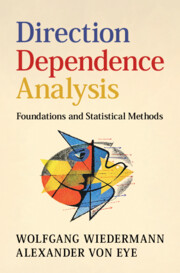Book contents
- Direction Dependence Analysis
- Direction Dependence Analysis
- Copyright page
- Contents
- Preface
- Chapter 1 Introduction
- Chapter 2 The Linear Regression Model
- Chapter 3 Asymmetry Properties of Distributions of Observed Variables
- Chapter 4 Asymmetry Properties of Error Distributions
- Chapter 5 Independence Properties of Causes and Errors
- Chapter 6 Direction of Dependence under Latent Confounding
- Chapter 7 The Integrated Framework of Direction Dependence Analysis
- Chapter 8 Stability and Sensitivity Analyses
- Chapter 9 Extensions and Applications
- Chapter 10 Statistical Software
- Chapter 11 Concluding Remarks
- References
- Index
Chapter 3 - Asymmetry Properties of Distributions of Observed Variables
Published online by Cambridge University Press: 16 September 2025
- Direction Dependence Analysis
- Direction Dependence Analysis
- Copyright page
- Contents
- Preface
- Chapter 1 Introduction
- Chapter 2 The Linear Regression Model
- Chapter 3 Asymmetry Properties of Distributions of Observed Variables
- Chapter 4 Asymmetry Properties of Error Distributions
- Chapter 5 Independence Properties of Causes and Errors
- Chapter 6 Direction of Dependence under Latent Confounding
- Chapter 7 The Integrated Framework of Direction Dependence Analysis
- Chapter 8 Stability and Sensitivity Analyses
- Chapter 9 Extensions and Applications
- Chapter 10 Statistical Software
- Chapter 11 Concluding Remarks
- References
- Index
Summary
Chapter 3 introduces asymmetry properties of the linear regression model that emerge from distributional properties of non-Gaussian variables. Foundations, significance procedures, and decision guidelines of third and fourth moment-based DDA measures are discussed for two scenarios. In the first scenario, we assume that the error term of the “true” model follows a Gaussian distribution. In the second scenario, we relax this distributional assumption and discuss direction of dependence based on distributional characteristics of observed variables when the “true” error term deviates from normality. Further, power characteristics of the DDA measures are presented based on a Monte-Carlo simulation experiment, and synthetic as well as real-world data examples are given to illustrate DDA model selection based on observed variable distributions.
Information
- Type
- Chapter
- Information
- Direction Dependence AnalysisFoundations and Statistical Methods, pp. 42 - 84Publisher: Cambridge University PressPrint publication year: 2025
